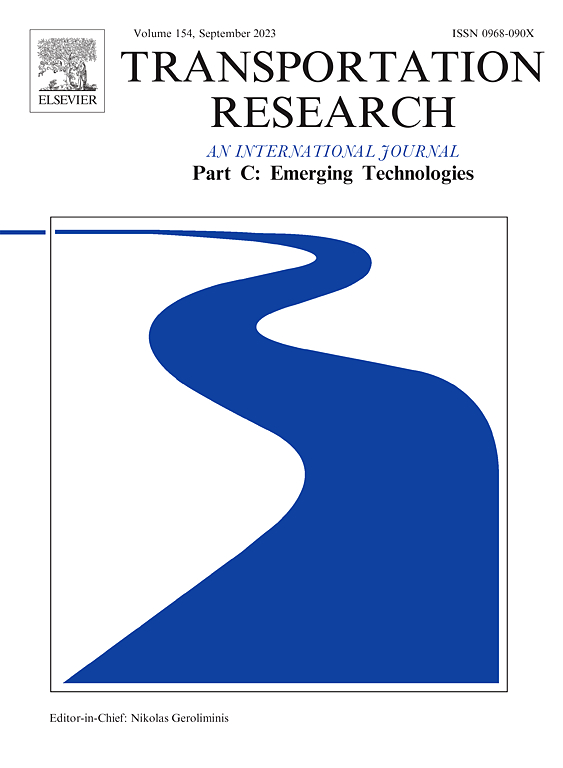电动汽车共享充电停车:考虑不守时的基于预约的动态滚动分配框架
IF 7.6
1区 工程技术
Q1 TRANSPORTATION SCIENCE & TECHNOLOGY
Transportation Research Part C-Emerging Technologies
Pub Date : 2025-07-17
DOI:10.1016/j.trc.2025.105259
引用次数: 0
摘要
在公共停车场安装充电站是一种广泛采用的策略,以满足日益增长的电动汽车充电需求。然而,在高需求地区,将传统停车位改造为充电车位可以增加停车巡航时间。此外,充电空间的闲置期可能会降低整体空间利用效率。为了提高混合动力停车场的空间利用率和收益最大化,提出了一种基于预约的动态滚动分配框架,并引入了一种新的收费空间共享机制。为了考虑用户的不守时,本文使用概率分布对到达和离开时间的不确定性进行建模,并将其纳入鲁棒优化公式,然后将其转化为混合整数规划(MIP)模型。这种方法可以估计出最小化连续用户之间的调度冲突所需的理论时间缓冲,给定预定义的停车或充电冲突的最大概率。基于大规模真实记录的模拟数据的案例研究验证了所提出模型的有效性。结果表明,与基线方法相比,动态滚动分配和共享机制显著提高了总收入,减少了用户冲突。此外,综合参数敏感性分析为管理混合动力停车场和优化运营性能提供了实用的见解。本文章由计算机程序翻译,如有差异,请以英文原文为准。
Electric vehicles shared charging and parking: A reservation-based dynamic rolling allocation framework considering unpunctuality
Installing charging stations in public parking lots is a widely adopted strategy to meet the growing demand for electric vehicle (EV) charging. However, in high-demand areas, repurposing conventional parking spaces as charging spaces can increase parking cruising time. Additionally, idle periods in charging spaces may reduce overall space utilization efficiency. This paper proposes a reservation-based dynamic rolling allocation framework that incorporates a novel charging space-sharing mechanism, aiming to enhance space utilization and maximize revenue in hybrid parking lots. To account for user unpunctuality, this paper models arrival and leave time uncertainty using a probability distribution and incorporate it into a robust optimization formulation, which is then transformed into a mixed-integer programming (MIP) model. This approach enables the estimation of a theoretical time buffer required to minimize scheduling conflicts between consecutive users, given a predefined maximum probability of parking or charging conflict. A case study based on simulated data derived from large-scale real-world records validates the effectiveness of the proposed model. Results show that the dynamic rolling allocation and sharing mechanisms significantly improve total revenue and reduce user conflicts compared to baseline approaches. Additionally, comprehensive parameter sensitivity analyses offer practical insights for managing hybrid parking lots and optimizing operational performance.
求助全文
通过发布文献求助,成功后即可免费获取论文全文。
去求助
来源期刊
CiteScore
15.80
自引率
12.00%
发文量
332
审稿时长
64 days
期刊介绍:
Transportation Research: Part C (TR_C) is dedicated to showcasing high-quality, scholarly research that delves into the development, applications, and implications of transportation systems and emerging technologies. Our focus lies not solely on individual technologies, but rather on their broader implications for the planning, design, operation, control, maintenance, and rehabilitation of transportation systems, services, and components. In essence, the intellectual core of the journal revolves around the transportation aspect rather than the technology itself. We actively encourage the integration of quantitative methods from diverse fields such as operations research, control systems, complex networks, computer science, and artificial intelligence. Join us in exploring the intersection of transportation systems and emerging technologies to drive innovation and progress in the field.

 求助内容:
求助内容: 应助结果提醒方式:
应助结果提醒方式:


